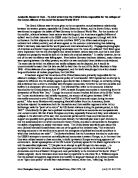Presidential Deceit - The President of the United States is under constant scrutiny.
Presidential Deceit
The President of the United States is under constant scrutiny. The presidency is unique because the office consists of a single person. Unlike the other branches of government, where individual accountability is practically non existent, the President offers up one person to focus on, one person accountable, one person with arguably much power. In order to properly measure the scope of presidential responsibility and performance, the office should be analyzed with skepticism. Views can not be clouded with notions of greatness or inherent goodness. The presidency has proved time and time again that its nature is general deceit. Presidents executes their own agenda, interpreting the vague Constitutional powers to their best interest.
Presidential scholars, unable to see through their haze, glorify presidents. Presidential short comings are attributed to outside forces out of presidential control. Bureaucracy is to blame, according to presidential scholars, for many failures of the President. Rose’s view of the presidency strongly adheres to the school of presidential admiration, in his claims of exaggerated presidential weakness. According to Rose, if the presidential budget is not fully accepted it hinders presidential power. The truth is that most presidential budgets are passed give or take a small percent. The problem with viewing the presidency as inherently good is failure to realize the true nature of presidential actions. Having a pessimistic outlook on the presidency ignites further scrutiny into presidential decisions. If the presidency is looked at as inherently deceitful, unwholesome and unhealthy, people would be less likely deceived by taking everything the President says at face value. Presidents have continually lied to the American people about why certain presidential decisions are made. Bill Clinton ran on a platform of national health care. The American people were disillusioned in thinking true actions were being taken on the part of the President to make this hope possible. In reality, Bill Clinton never planned on providing a plan for national healthcare. His proposed plan was unconscionable and he vetoed a plan proven successful in other countries. He vetoed the plan because it failed to include insurance companies that were also his campaign contributors.








